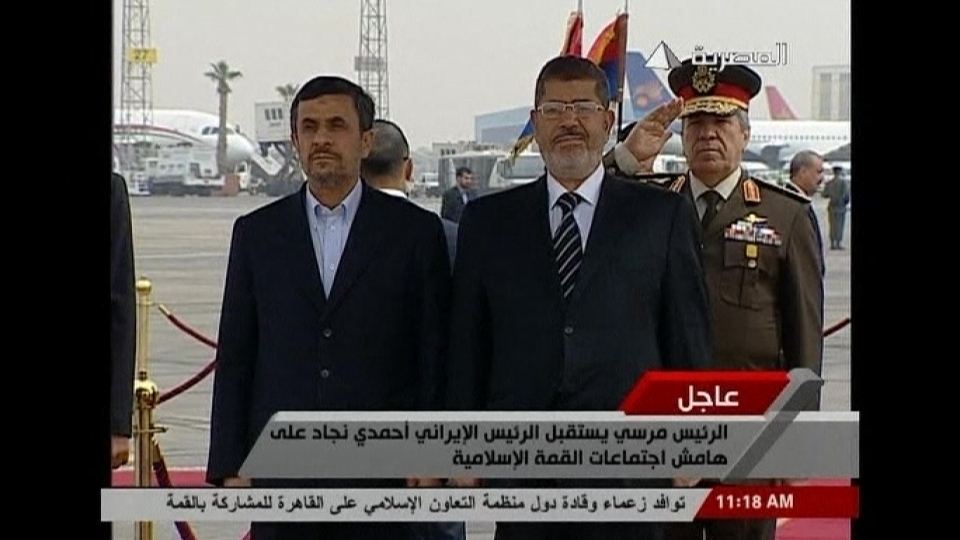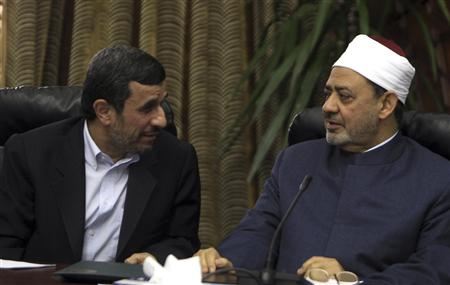www.aljazeerah.info
News, February 2013
Archives
Mission & Name
Conflict Terminology
Editorials
Gaza Holocaust
Gulf War
Isdood
Islam
News
News Photos
Opinion Editorials
US Foreign Policy (Dr. El-Najjar's Articles)
www.aljazeerah.info
|
Editorial Note: The following news reports are summaries from original sources. They may also include corrections of Arabic names and political terminology. Comments are in parentheses. |
Islamic Conference Convenes in Cairo, With Syria, Mali Topping its Agenda
 |
 |
| President Morsi welcomes President Ahmadinejad, February 5, 2013. | President Ahmadinejad visiting Shaikh Ahmed Al-Tayyeb, February 5, 2013. |
Egypt president hosts Islamic summit
Associated Press
Wednesday, February 6, 2013CAIRO (AP) —
Egypt's president is taking a break from mounting domestic troubles to host an Islamic summit that has, even before starting, laid bare divisions within the Muslim world.
Mohammed Morsi opens the summit on Wednesday, a day after his central bank reported another alarming drop in foreign currency reserves. The Islamist Morsi is also facing a seemingly endless wave of protests by an opposition that demands an end to what it describes as his efforts to monopolize power and advance the interests of his Muslim Brotherhood group.
The summit's most high profile participant, Iranian President Mahmoud Ahmadinejad, was publicly warned on Tuesday against interference by Iran in the affairs of the Gulf Arab nations. Egypt's most prominent cleric also urged Iran to halt efforts to spread Shiite Islam.
Iran says ready to lend Egypt much-needed funds
CAIRO (AP) —
Iran's president says his country is ready to provide a "big credit line" to help revive the distressed economy of Egypt, which saw its foreign currency reserves — already at critically low levels — fall nearly 10 percent last month.
Mahmoud Ahmadinejad, whose comments were published in the state-run Al-Ahram newspaper on Wednesday, is on a three-day visit to Egypt, centered around an Islamic summit.
It is the first trip by an Iranian leader in more than three decades. The two countries severed relations after the 1979 Islamic revolution, but after fall of Egypt's close U.S. ally Hosni Mubarak and last summer's election of an Islamist president, the two countries have grown closer.
Islamic summit to tackle Syria and other problems
By Paul Taylor and Shaimaa Fayed
February 5, 2013
CAIRO (Reuters) -
Leaders of Islamic nations will press for a negotiated end to Syria's civil war at a summit in Cairo starting on Wednesday that thrusts Egypt's new Islamist president to center stage amid political and economic turbulence.
With Iranian President Mahmoud Ahmadinejad making an ice-breaking visit to Egypt after 34 years of estrangement, the two-day meeting will focus on how to stop bloodshed in Syria, where Tehran is one of President Bashar al-Assad's last allies.
A communique drafted by foreign ministers of the 56-member Organisation of Islamic Cooperation and seen by Reuters blames Assad's government for most of the slaughter and urges it to open talks on a political transition.
It also endorses the opposition Syrian National Coalition (SNC) and urges it to speed up the creation of a transitional government "to be ready to assume responsibility in full until the completion of the desired political change process".
The draft statement, subject to amendment at the summit, calls for a Syrian-led solution to the conflict, in which some 60,000 people have died, and rejected outside intervention.
Without mentioning Assad, it says: "We urge the Syrian regime to show wisdom and call for serious dialogue to take place between the national coalition of the Syrian revolution, opposition forces, and representatives of the Syrian government committed to political transformation in Syria and those who have not been directly involved in any form of oppression..."
SNC leader Moaz Alkhatib offered at the weekend to meet Assad's ceremonial deputy, Farouq al-Shara, for peace talks if the authorities released thousands of prisoners.
Egyptian President Mohamed Mursi, a member of the Muslim Brotherhood, will seek to project his country as the leader of the Islamic world when he opens the summit seven months after becoming Egypt's first democratically elected head of state.
Egypt, the most populous Arab state, is taking over the OIC chair for three years at a time of upheaval in the Arab world and sectarian tension between the main branches of Islam. Mursi faces sustained protests at home by liberal and leftist opponents who accuse him of seeking to impose Islamist rule.
AHMADINEJAD EMBRACED, REBUKED
Mursi embraced Ahmadinejad and gave him a red-carpet airport welcome on the Iranian leader's arrival on Tuesday, but his foreign minister hastened to assure Gulf Arab states that Egypt would not sacrifice their security in opening to Tehran.
Diplomats and analysts doubt that full diplomatic relations, broken after Iran's 1979 Islamic Revolution and Egypt's peace treaty with Israel in the same year, will be restored soon.
Underlying tensions between the majority Sunni Muslims and the minority Shi'ites burst into the open on Tuesday when Ahmadinejad met Egypt's leading Muslim scholar and received a public scolding over Iran's approach to Sunni Arab nations.
Sheikh Ahmed al-Tayeb, head of the 1,000-year-old seat of religious learning, urged Iran to give Iranian Sunni Muslims full rights, refrain from interfering in Gulf Arab states, and recognize Bahrain as a "sisterly Arab nation".
A statement issued by al-Azhar said Tayeb also rejected what he called the "extension of Shi'ite reach".
Ahmadinejad flashed victory signs and struck an upbeat note after the talks, inviting Egyptian religious scholars to Iran.
Syria will not take part in the Islamic summit after it was suspended from the OIC last August. The Syrian opposition said it had not received an invitation and would not be attending.
SNC spokesman Walid al-Bunni said there had been no response from the Syrian government to Alkhatib's call for talks.
Some members of the opposition coalition have called for an emergency meeting of the coalition to discuss the controversial proposal.
The moderate cleric who heads the SNC's 70-member assembly made the offer after meeting the foreign ministers of Iran and Russia, Assad's main allies, at a weekend conference in Germany.
The OIC summit is also expected to discuss fighting in Mali, where former colonial power France intervened at the request of the government last month to drive out insurgents who had captured the north of the West African country and were advancing towards the capital, Bamako.
(Additional reporting by Yasmine Saleh, Marwa Awad and Tom Perry; Writing by Paul Taylor; Editing by Mark Heinrich)
Fair Use Notice
This site contains copyrighted material the
use of which has not always been specifically authorized by the copyright
owner. We are making such material available in our efforts to advance
understanding of environmental, political, human rights, economic,
democracy, scientific, and social justice issues, etc. We believe this
constitutes a 'fair use' of any such copyrighted material as provided for
in section 107 of the US Copyright Law. In accordance with Title 17 U.S.C.
Section 107, the material on this site is
distributed without profit to those
who have expressed a prior interest in receiving the included information
for research and educational purposes. For more information go to: http://www.law.cornell.edu/uscode/17/107.shtml.
If you wish to use copyrighted material from this site for purposes of
your own that go beyond 'fair use', you must obtain permission from the
copyright owner.
|
|
|
|
||
|
||||||


